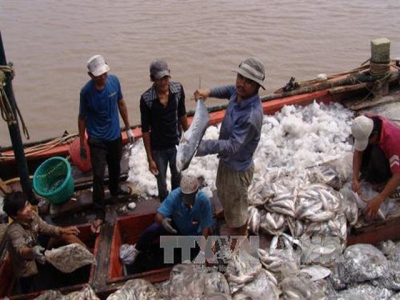Use of fish byproducts could lead to higher profits: experts

The fisheries sector in Việt Nam should use more seafood by-products such as bones, heads and skin to add value to the industry. — VNA/VNS Photo
Ho Chi Minh City — The fisheries sector in Việt Nam should use more seafood by-products such as bones, heads and skin to add value to the industry, experts said during an event held between Vietnamese and Norwegian fishery firms on Wednesday in HCM City.
For the last 30 years, Việt Nam and Norway, which are among the top 10 biggest fishery nations in the world, have been working together in the marine industry.
Norwegian firms have been developing technologies and processes to use as much from the fish as possible, or what the industry calls "Marine Rest Raw Materials", to make human and animal food, cosmetics and pharmaceutical products.
Grete Lochen, Norwegian Ambassador in Việt Nam, said that fisheries and aquaculture were contributing greatly to the global food supply, but there was a great need to enhance food security, both through sustainable fishing and aquaculture, and by a higher use of ’rest raw matierals’.
Trần Đình Luân, deputy general director of the Directorate of Fisheries, said that the country’s high-quality seafood was exported to many countries, but that Marine Rest Raw Materials could yield more profits and reduce the need for discharge of waste.
Phan Thanh Lộc, director of VietnamFood, said that such matierals account for a large portion of the input in fishery, especially shrimp, and contain a great deal of nutrition.
They can bring great value to firms and sustainable development to Việt Nam’s fishery industry, he said.
Vietnamese firms have been using a small fraction of the "rest raw material" as Vietnamese technologies for processing the materials are still limited.
More research and investment into technologies, as well as trade promotion, are needed to make use of these highly profitable materials, according to Lộc.
Vietnamese factories should not view these materials as waste, but as products and materials for processing, and preserve them more carefully to maintain their high quality.
At the summit, Norwegian firms in the fishery industries expressed interest in working with Vietnamese firms and looking for local suppliers of high-quality fish and fish products, and buyers of their technologies, such as fish feed, processing technologies, fish oil and fish meal.
The business summit was held by the Directorate of Fisheries, the Royal Norwegian Embassy in Hà Nội and Innovation Norway.
Có thể bạn quan tâm
 Đồng Tháp aquaculture farms almost reach full-year tra production target
Đồng Tháp aquaculture farms almost reach full-year tra production target Đồng Tháp Province, the Mekong Delta’s largest tra fish producer, has more than 2,200ha of aquaculture farms breeding the fish and they have produced about 438
 Aquaculture in action: in-pond innovation doubles tilapia production in Egyptian trials
Aquaculture in action: in-pond innovation doubles tilapia production in Egyptian trials In the face of rising production costs and limited land and water availability, Egyptian fish farmers are looking for new ways to achieve higher productivity
 HCM City expects 25 thousand tons of shrimps under global standards by 2020
HCM City expects 25 thousand tons of shrimps under global standards by 2020 Productions of farmed shrimps expects to reach 28,196 tons (Cần Giờ 28,196 tons, Nhà Bè 1,350 tons) and fresh water shrimp (giant river prawn) 200 tons.